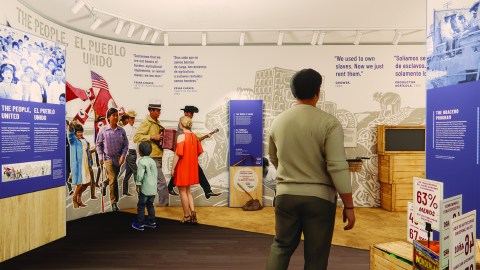Many people, giving advice to people aiming at museum careers, have pointed out that you have to be willing to relocate. (See, for example, Robert Connolly’s recent Thoughts on How to Get a Museum Job). Today’s post raises the question—how far?
Well, how about the Middle East?
Whether it’s Dubai contracting with major museums (the Louvre, Guggenheim, Zayed National) to open branches in Abu Dhabi, Saudi Arabia tasking the state oil company with opening a national museum from scratch, or Qatar setting world records for art prices, the Middle East is a growth area for museums and, at least for now, many of the people needed to jump start these projects are being recruited internationally. At the time I’m writing this post, the Alliance Job HQ board has six postings from Saudi Aramco for positions in Dhahran. If the US continues to pump out museum studies graduates at its current rate, as well as generating a cadre of experienced professionals cut loose by layoffs & downsizing, global employment prospects may offer a good bet for staying in the museum field.
But deciding to port your expertise to another country shouldn’t be done lightly—there are significant personal concerns to consider, as well as a need to be aware of the ways in which American museum standards and best practices may or may not apply overseas. For these reasons, I invited Alliance Accreditation Commissioner Terrie Rouse to share some words of wisdom based on her recent experiences working in Saudi Arabia.
First—what is it like, as a foreigner, to work in the Middle East? You may have read scary news stories about the general conditions of employment for guest workers in Middle Eastern countries, which some have compared to indentured servitude. As the article in the previous link explains, this isn’t just an issue for low-skilled workers—work contracts may make professionals dependent on their employer for basic rights such as travel within the country or (most important) leaving the country. Before you go, be sure you understand what rights and protections you do and do not have, based on your written agreement with your employer.
Here’s Terrie’s thoughts on “negotiating the contract”:
Another legitimate consideration, especially given that the majority of young museum studies graduates in the US are women, is the status and rights of women in the Middle East. Islamic feminism is still an evolving concept, and if you are a woman considering whether to work in an Islamic society, you should consider the option with open eyes.
Terrie Rouse: On being a Woman in the Middle East
Please don’t take this post as being overly negative—its goal is to encourage you to be prudent. I’m not saying that these positions can’t be great opportunities to learn about museums and about other cultures. If you do take one of these jobs, make sure you take full advantage of the experience! After all, it’s not all about work.
Terrie on Key Cultural Experiences
My advice, if you decide to take any job overseas, is to do your research first, and read up on the forces shaping the country you’ll be working in. Before I taught a workshop in Saudi Arabia this spring, I studied a number of useful reports, including this one from the Wilson Center: Saudi Arabia’s Youth and the Kingdom’s Future. The Middle East is undergoing rapid evolution as it deals with a population massively skewed towards the young, high youth unemployment, the impact of social media on mores and customs, and the prospect of having to find a new basis for their economies as oil production declines. I found it very rewarding to get a first-hand look, however brief, at how these forces are shaping the museums being built to serve these societies.
If you’ve worked in the Middle East, please share your observations and advice in the comment section below; if you are considering applying for one of these jobs, use this as a forum for connecting with peers who might help you weigh your decision.








The conditions of Saudi Arabia don't apply to all countries of the MIddle East.. having said this, I think it would be a good idea to point out the difference in your article. Cities such a Dubai, Bahrain, Beirut, Amman and Qatar (to name a few) are actually very open to international workers. Basing your article on Saudi Arabia doesn't give a truthful or standard image of the working and living conditions in the Middle East as a whole. Thanks.
Thank you for contributing, Nathalie. This kind of first-hand observation is exactly the kind of information I hope readers will share.